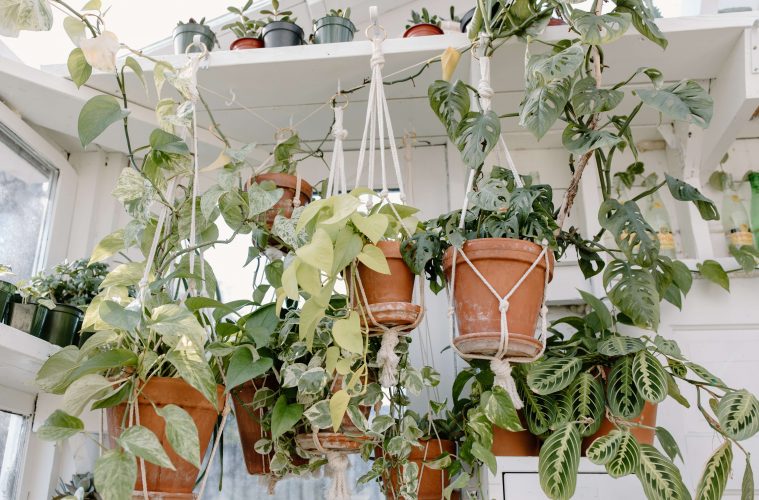Houseplants have become a staple in most homes and are a wonderful way to liven up a space and make it feel more homely. Bring nature indoors and make your home feel like a cottage garden paradise by adding plants overhead.
Find a list of the best plants to use for your indoor overheads
String of pearls – Senecio rowleyanus
With cute bead-shaped leaves, string of pearls could not have a more descriptive common name. The semi-succulent beads make this plant incredibly low-maintenance and easy to manage.
Devil’s Ivy – Epipremnum aureum
Commonly known as Pothos, Devil’s Ivy, or Money plant, this trailing beauty is a great houseplant for beginners. With several cultivars to choose from, including the variegated ‘N’Joy’ or ‘Marble Queen’, there is something for everyone in this species.
Heartleaf Philodendron – Philodendron scandens
Often confused for the Pothos, this Philodendron species has gorgeous heart-shaped leaves in several interesting colours. Try the popular ‘Brazil’ cultivar for a splash of bright green colour.
Hoya spp.
One of the few genera known to reliably flower indoors, you can’t go wrong using a Hoya as a hanging plant. Many species have long, semi-succulent vines that produce cute clusters of scented blooms when the sunlight is right.
Read more: 5 Philodendron varieties to grow indoors
Boston Fern – Nephrolepis exaltata
Taking it back to the houseplant boom of the 1970’s, a Boston fern is a hanging houseplant staple. These classic beauties need the right region to thrive as they suffer when humidity is low.
Bird’s Nest Fern – Asplenium nidus
Another fern that is less fussy, or perhaps less expressive about its struggles, is the Bird’s Nest Fern. This upright plant has arching fronds that cascade over the sides of a pot – great for planting closer to eye level.
Donkey’s Tail – Sedum morganianum
A cute name with even cuter vines, Donkey’s Tail is a succulent plant with rounded, juicy leaves. Appreciating more sun than other houseplants, these are best placed on a balcony or patio where they can bask in the sun’s rays.
ALSO SEE:
An original version of this article was published in the Garden&Home June 2022 print magazine.
Feature image: Pexels

